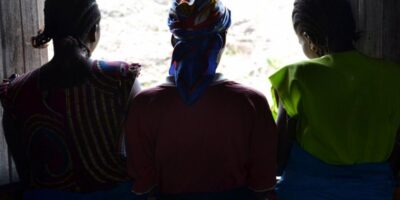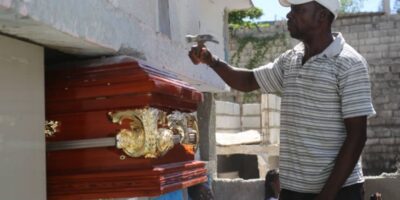The state of affairs created by Adhasa Oil seems to exceed even the city authorities
Lire cet article en français
After retiring as a nurse, Edite Legagneur wanted to settle down in a quiet area with her husband. She set her sights on the neighborhood of Sanon, in the commune of Bergeaud, Les Cayes, where she was born. In 2019, she built her home there, to rest.
Her rest lasted only two years. Since 2021, her paradise is under threat: a vetiver oil factory, Adhasa Oil, is being built on a piece of land next to hers. The environmental consequences are expected to be significant and worry the health professional.
The nurse immediately rallied against this project, which will not fail to pollute the air in the neighborhood, and the water table on which its residents depend, according to her understanding of the matter at hand.
Edite Legagneur, journalist Max-Imbert Marcelin and other citizens joined forces to try to stop construction while there was still time. Several petitions and steps later, the Ministry of the Environment issued a statement. In a letter dated July 11, 2022, Minister James Cadet asked Adhasa Oil to halt construction in the name of the “Precautionary Principle”.
But this victory seems to have been short-lived: despite the Ministry’s injunction, the work has not stopped. “I have the impression that over the last two months they have doubled their efforts, explains Edite Legagneur. It’s as if they wanted us to understand that once the plant was finished, nothing could stop them.”
The situation seems to exceed even the city authorities. Sylvie Rameau, mayor of Les Cayes, reports that the factory did not have a building permit and that the owners have not ceased to fail in their obligations towards the government. “We’ve called them several times, without success, she explains. We went to the construction site, but the people in charge kept running away. It is difficult to put together a joint intervention between several services, the city hall, the Ministry of Commerce, the Ministry of the Environment …”
The director of the Ministry of the Environment in the South, Jean Marc Chérisier, wants to be more reassuring. He said that the prosecutor’s office will soon be asked to put a seal on construction. “From the beginning of the construction of the plant, we had objections, explains Cherisier. But I don’t know how they managed to get permission from the ministry in the first place. Prior to the minister’s decision.”
Donald Médard, the owner of the plant under construction, rejects all accusations outright, characterizing the situation as “jealousy” and as personal vendettas against him. The entrepreneur, who owns a radio station, assures that all of his documents are in order, from the authorization from City Hall to the non-objection of the ministry. When asked about the recent decision by authorities to suspend construction, he assures that he is only building a fence to secure his site.
As for the concerns of the citizens, Médard downplays the consequences. “My plant will not run on fuel oil, but instead on gasoline, diesel, and even kerosene. It will take seven hours to complete a production cycle. A car that leaves Les Cayes to go to Port-au-Prince also produces smoke, for about six hours. Should they be banned?” he asks.
In Bergeaud, a lot of land is planted with vetiver. The crop is profitable, according to journalist Max-Imbert Marcelin. “It is a grass that does not require much maintenance, he explains. The planters simply wait for the harvest. The oil that is extracted is very valuable.”
Cultivation of vetiver is therefore advantageous compared to other cereal crops. Vetiver also has important intrinsic qualities in its ability to protect against soil erosion. However, this same product can be the cause of soil erosion, which it has the power to fight. “At harvest time, the planters dig the soil to recover the root. And in these times, the soil becomes vulnerable if it rains. Since the plant is planted at high altitudes, the soil will sink below,” explains Max-Imbert Marcelin.
For the residents of Sanon city, the environmental impact of the plant overshadows the benefits of vetiver. Edith Legagneur worries about the lasting health effects of the thick, black smoke that will come out of the factory’s chimneys. “I am 73 years old. My husband is 77. I have a three-year-old child and a fifteen-year-old girl at home. The damage to our health would be irreparable,” she complains.
CO2 is only part of the problem. Water is another. “Right next to the plant is the Dormante River, says Marcelin. According to what we understand, this is the river into which the plant’s wastewater would be discharged.”
In this case, the reporter warns, there could be a real problem for fishermen, who get their fish from the river, and for those who bathe or wash their clothes in it. The director of the Southern Ministry of the Environment also has concerns about the waste produced by the plant.
If the sewage is not dumped in the river, residents fear it will end up in the groundwater, contaminating the water they use every day. “The alternative to dumping the wastewater into the river is to dump it in the ground, says Max-Imbert Marcelin. We use wells because there is no public drinking water system. What will happen to this water?”, posits the journalist.
The Botanical Garden of Les Cayes is also threatened by the construction of this plant, which is only a few hundred meters from its lot.
Donald Médard confirms that everything is planned: “The water they’re talking about will be piped to a dry pit I’m having built on another of my properties.”
Entrepreneurs in Les Cayes have long been interested in vetiver. Haiti is one of the world’s largest producers of the plant. This new factory in Bergeaud would increase the number of processing sites where vetiver roots are transformed into oil. There are already more than fifteen in the city of Les Cayes, according to Max. All in all, it is estimated that between 5000 and 7000 hectares are planted with vetiver across the country. It takes about 150 kg of roots to produce 1 kg of oil, the essence of which has been used in perfumes around the world since the early 20th century.
Among the country’s exports, essential oils, in which vetiver oil takes the lead, following textiles. For the year 2020, these exports totaled more than 30 million U.S. dollars, according to OEC data. These oils are destined for France, Spain, the United States, even Singapore, and the United Arab Emirates.
English translation by Didenique Jocelyn and Sarah Jean.







Comments